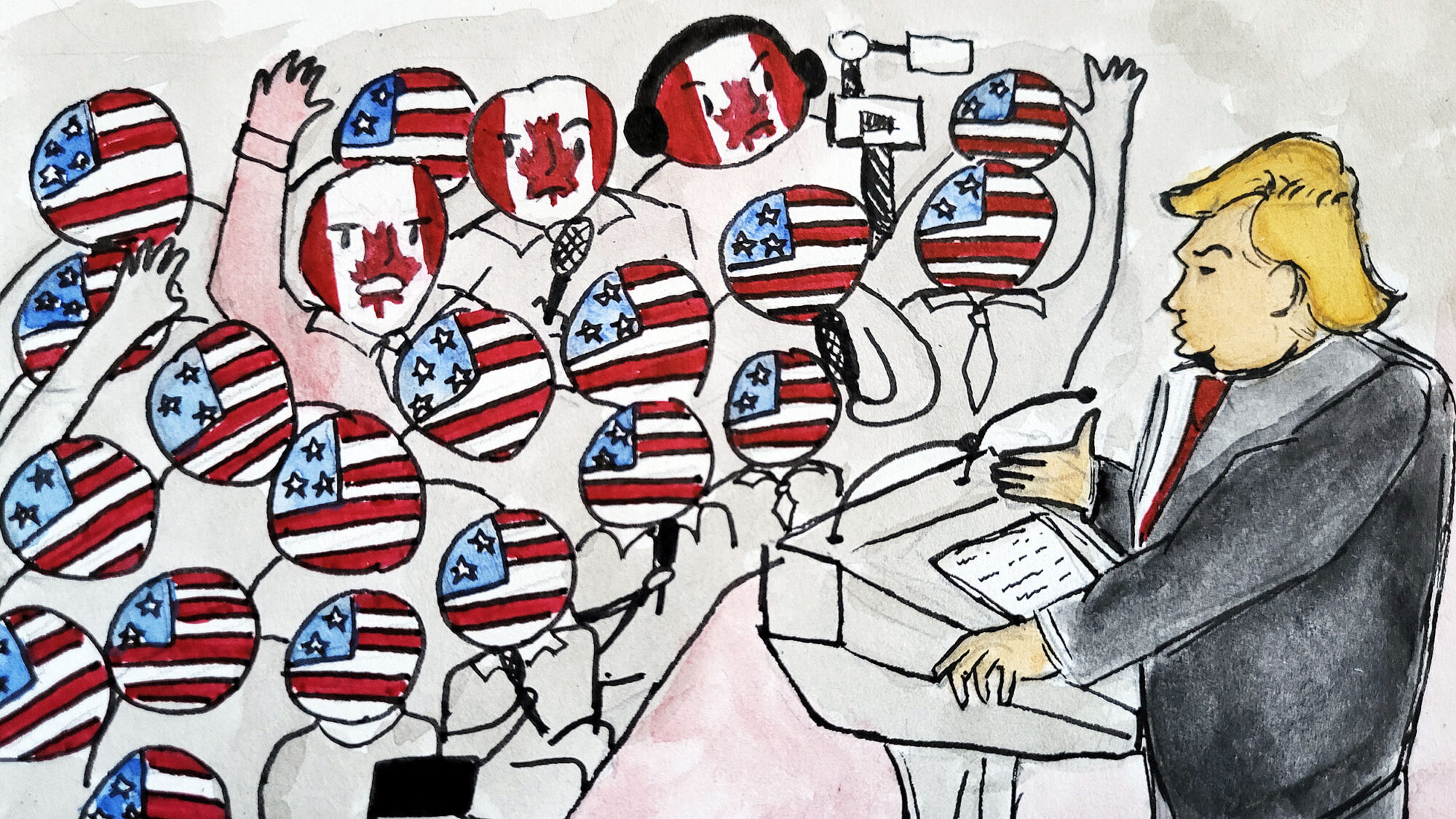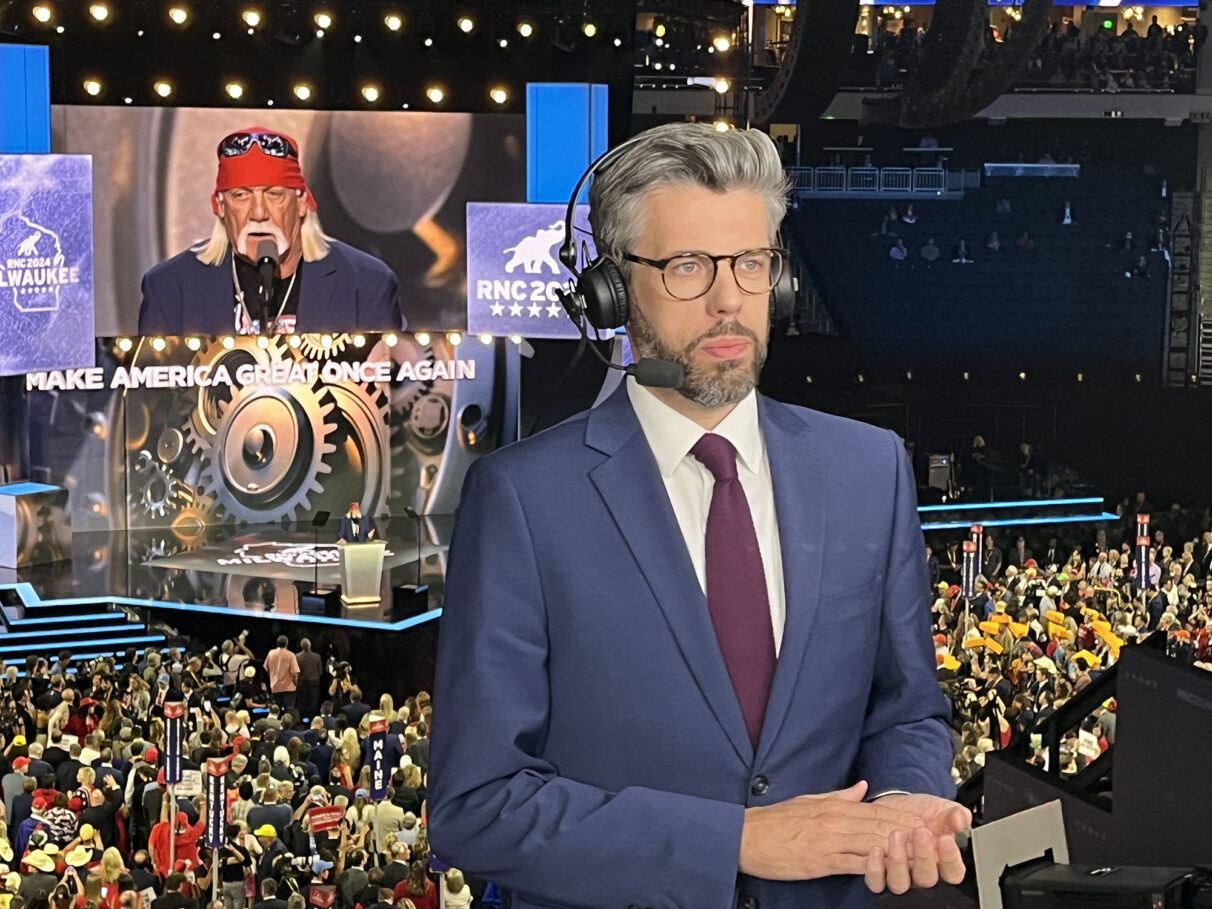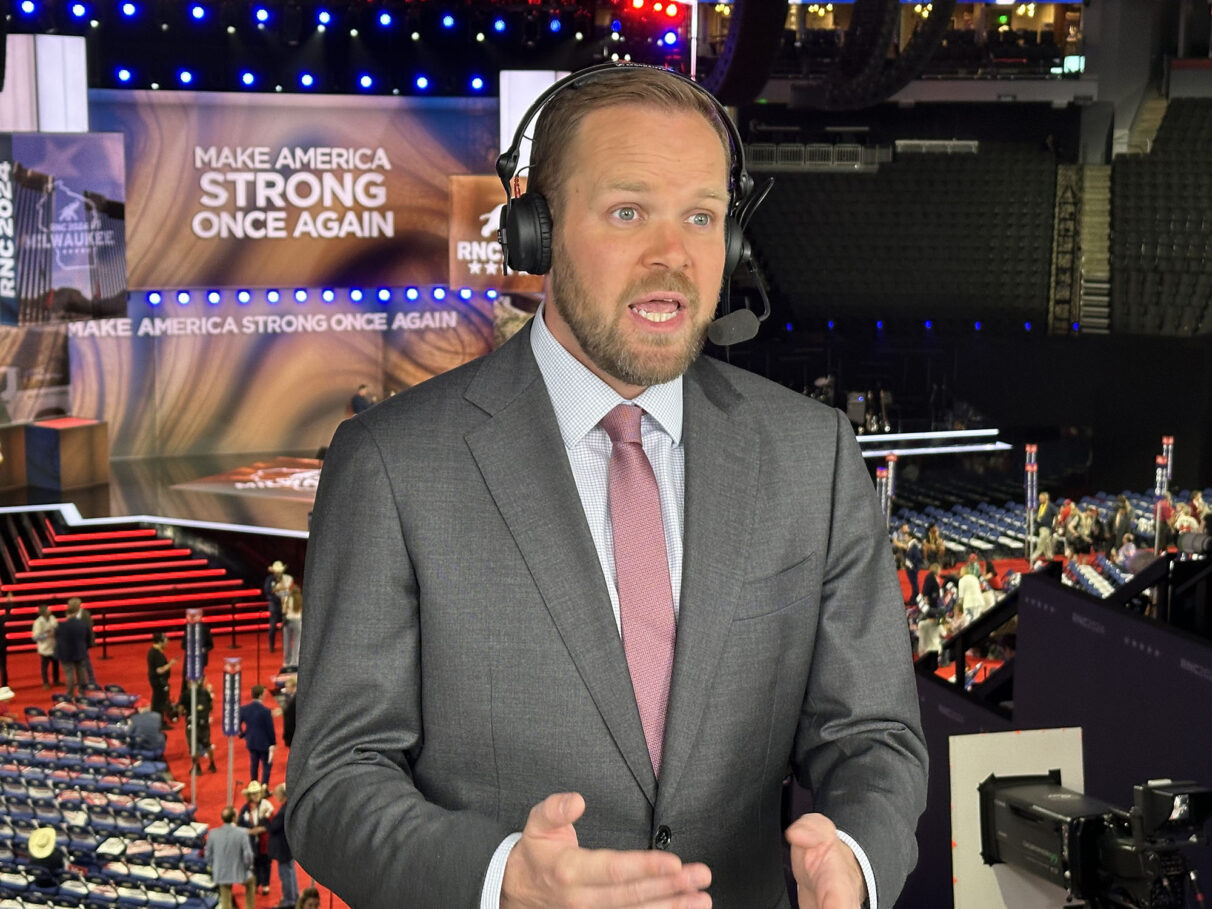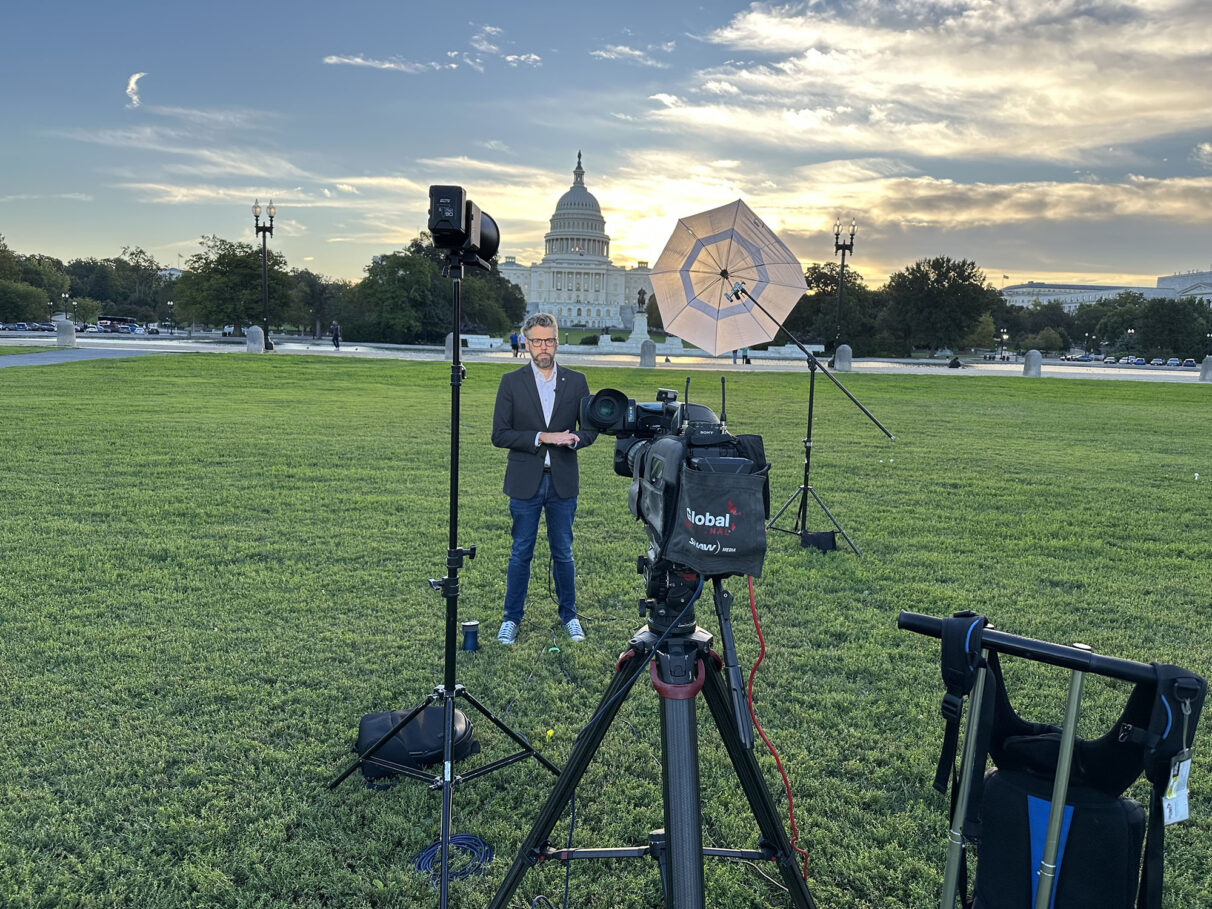Canadian reporting from under the Trump circus tent

caption
Canadian journalists in a sea of their American counterparts during a White House briefing with President Trump.Correspondents working in the U.S. feel uneasy in the face of the Trump administration's volatility
Alexander Panetta knew he was on the way out.
Panetta, having spent 12 years in the United States, most recently as CBC News’ Washington correspondent, has felt his attitude towards covering news sour throughout the Donald Trump administrations.
This shift became apparent during a family dinner in November 2024, three weeks after Trump won a second presidential term.
“I remember we were sitting down, enjoying a family dinner for the first time in a while,” Panetta said in an interview with The Signal.
“I remember thinking, ‘Why do I have this feeling I’m one tweet away from this moment being ruined?’ ”
Five minutes later, Panetta felt an alert go off on his watch. Then another. Then another. When he checked his phone, he saw what he termed “the motherlode of news” for a Canadian correspondent in Washington. Trump had tweeted threats of a 25 per cent tariff against certain Canadian and Mexican goods crossing into the United States.
“And I was just like, ‘Oh yeah, there we go.’ And the next 10 days of my life were crazy. And [American] Thanksgiving weekend was ruined.”
“As a reporter I should have felt a thrill,” Panetta later wrote in an email correspondence with The Signal.
“For most of my professional life, I would have been energized. But at this specific moment, at this specific point in my life, I remember thinking, ‘F—. Four years of this.’ ”
In July 2025, Panetta announced his departure from the U.S. in an article titled, “Stepping off the Trump treadmill: A CBC correspondent bids farewell to Washington.” He later moved to Turkey with his family.
Canadian correspondents living in the U.S. are frontline witnesses to the increasing hostility and unrest unfolding there. The growing tension has left some feeling unsettled.
“The fundamental thing about journalism is you’re supposed to be happy when chaos strikes,” said Panetta.
“If something really major happens, you’re supposed to be like, ‘Yes, I’m gonna get my bag,’ and you might even have a travel bag packed all the time, it’s time to go. I was scared of news.”
Panetta is not the only foreign correspondent feeling uneasy.
From across the border, speaking to The Signal through a computer screen, is Reggie Cecchini, Global News’ Washington correspondent. Cecchini, wearing a stylish black suit, sits in an office with a television displaying a Global News screensaver glowing behind him. A well-kept plant stands in the corner of the room and a microphone sits near the windowsill.
Cecchini has spent 10 years as a journalist in the U.S., eight as a foreign correspondent. He said tension has escalated between Trump’s first and second terms.
“During Trump one, it was disorganized chaos, sometimes it felt like organized chaos, and it was something that this country had never been through before,” said Cecchini. “It’s something that I had never been through before in Canada. Every day was an adventure.
“In the second administration, life in the United States has become a lot more unpredictable,” Cecchini continued, referring to the administration’s anti-immigration policies, the deployment of the National Guard across America and frequent raids by the United States Immigration and Customs Enforcement (ICE).
“Life is a lot more exhausting now,” said Cecchini. “And it can sometimes feel scary, and it can sometimes feel like you don’t know what’s going to come next.”

caption
Reggie Cecchini reporting for Global News from the Republican National Convention.‘Fake news!’: Trump’s 10-year campaign against news outlets
Trump’s war on the news did not come out of right field during his second term. A 2019 study by Michael Cornfield at George Washington University reported the term “fake news” first emerged in its current usage in October 2016, during the presidential contest between Trump and Democratic candidate Hilary Clinton.
Trump defeated Clinton, serving his first term from 2016-20.
Cornfield highlighted Trump’s use of the term to “cast doubt on news media organizations,” saying that Trump relies on eight tactics to turn the American people against the press, including demonization, distortion, and self-glorification.
“Before 2016, I don’t think I had ever heard the term ‘fake news’ or ‘fake news media’ thrown around outside of maybe some kind of joking atmosphere,” said Cecchini.
“It’s now entered the lexicon where if you are an outlet, foreign or domestic, that says something that the president doesn’t like, you’re immediately considered fake news, and there’s nothing that’s going to change that.”
“Fake news” has not been the U.S. president’s only media tactic. In 2018, former Trump strategist Stephen Bannon boasted about deliberately creating a kind of media circus to distract journalists from investigating the Trump administration.
This is achieved by flooding social media and news zones with nonsensical tweets, data, and inflammatory stories.
Paul Knox, a journalism professor at Toronto Metropolitan University, told The Signal that “flooding the zone” makes it “impossible” for the media and political opponents to operate because they now have to spend their time debunking these statements, rather than holding the current administration accountable.
Panetta said it can be challenging to keep up with the sheer volume of stories. He used an example of three major news stories landing in the 22 minutes it took him to bathe his children one evening in June.
“There’s just no way that the human body, the human eyeballs, the human ears, the human fingertips, can see, hear, process, type all of that in a day,” said Panetta.
Drawing back the curtain: Has Trump only been bad for the media?
Not all the current administration’s approaches to media have been hostile. Jackson Proskow, chief of Global News’ Washington bureau, told The Signal the Trump administration is “very media friendly.”
“If we want to get a response to the latest things on tariffs and trade, (the White House) will get back to us really, really quickly,” said Proskow.
“They’ve been very accommodating in terms of access to the White House and press events, in fact, more so than the (former president) Biden administration was, and they’ve made it easier for journalists to actually operate on the White House grounds.”
However, while the White House has made it easier for organizations to get in, Proskow said they have become more vocal about coverage. For example, he said, consider the White House ban against the Associated Press from the Oval Office for its refusal to refer to the Gulf of Mexico as the “Gulf of America” as per the president’s instruction.
Cecchini criticized the Trump administration’s scrutiny of media coverage.
“If you don’t say words that some people want to hear, you can be criticized very heavily. You can be picked on online, you can receive emails being critical of the fact that you are being critical, and that has made it difficult.”
Proskow said the White House has also become more restrictive on reporters who have access to the Oval Office.
“You’re seeing some fringier outlets now invited into the press pool, replacing seats that had typically been reserved for legacy news organizations,” said Proskow.
Where does Canadian media fit in this new America?
In both the first and second Trump administrations, the U.S Department of Homeland Security proposed visa changes which would limit the amount of time foreign correspondents can work in the U.S.
If enacted, this proposal would reduce a journalist’s visa duration from five years with infinite renewals to a maximum of 240 days with only one potential renewal.
Proskow said these proposed changes to media visas would make it difficult for foreign correspondents to establish themselves in America.
“I would argue that I spent my first two to three years down here really learning and getting up to speed because it is such a big, complicated country,” said Proskow.
However, Proskow said he was not sure the visa restrictions were necessarily a “crackdown on the press as much as an administrative question.”
“It wasn’t really a high bar to prove that you’re coming in as a foreign journalist, other than a letter from your employer,” said Proskow. “I think they’re just sort of looking at this in the easy sense of, ‘Well, we can just eliminate this.’ ”
Other Canadian journalists argue that shortening foreign visas can be seen as a direct attack against freedom of the press. In September 2025, the Canadian Association of Journalists and Canadian news agencies including CBC, CTV News and the Toronto Star signed a joint statement calling for the proposal to be withdrawn.
“Five years almost doesn’t feel like enough time to get through one administration and cover the transition to the next,” said Cecchini, who was able to advance his visa into a green card.
“It’s impossible to think how somebody coming here on a visa for less than a year would be able to get up to date with American politics and then see through whatever happens.”
“I think that that sets a dangerous precedent going forward because at the end of the day, especially when you’re a foreign correspondent with a foreign audience, what happens in the United States has an impact,” said Cecchini.

caption
Jackson Proskow reporting live for Global News.Looking forward: Canada’s place in the U.S. media
With tariffs in the news almost daily, Cecchini said Canada is becoming a bigger talking point in the administration. But this does not make his job any easier.
“The press office doesn’t often want to talk about Canada, or when you talk to them about Canada, there’s a bit of pushback,” said Cecchini.
“The administration is being very open and welcoming, especially to a lot of foreign press, but they’re being opening and welcoming to a press that is generally painting a more favourable portrait of this administration, not focusing on the realities, or the negatives that may come out of it.”
With the difficulties in covering American news, why do Canadian news outlets bother?
Panetta said American news networks are too focused on what will get ratings from American audiences and thus are “completely disconnected from what matters to Canadians.”
To keep Canada his priority, Panetta said his daily routine included searching American databases for mentions of Canada or news that affects Canadians.
“Because if I didn’t do it, no one would. We only had a few Canadian correspondents in the United States. If one day the (Globe and Mail) guy or the woman at (the Canadian Press) might be doing an American domestic story, that means there’s no one there looking for stuff that might affect our country, in a country that affects our country every day.”
“That’s why you need a foreign correspondent. Because if you don’t have them there, no one’s going to do that.”
Proskow said funding is one of the larger threats for maintaining a Canadian press presence in America.
“That exchange rate hurts companies to begin with, and then the cost of operating down here, especially in Washington, it’s not a cheap place to operate.”
“I hope that they can continue to see the value in investing in telling the U.S. story for Canadians.”
As a non-U.S. citizen, Cecchini said the Trump administration’s aggressive and often illegal use of ICE to remove foreigners makes reporting these stories “difficult.”
“This is the first time where I’m now reporting on stories that are impacting the United States, but they’re actually impacting me on my walk into work every day,” said Cecchini.
“It’s the first time in 10 years that I’ve actually questioned whether or not I want to continue to live here,” said Cecchini.
“There are sometimes where I am afraid to tell the story, and if I’m afraid to tell the story, I have to question why am I afraid and do I want to do it? And is there going to be a ramification? I’ve never felt like that in my career before.”

caption
Reggie Cecchini reporting for Global News.About the author

Serra Hamilton
...

Leave a Reply